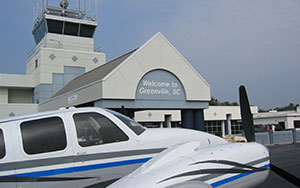
March 14, 2018
South Carolina’s 57 publicly owned airports contribute $16.3 billion annually to state and local economies, while supporting almost 165,000 jobs, according to the 2018 Statewide Aviation System Plan and Economic Impact Report produced by the South Carolina Aeronautics Commission.
The study found that general aviation is growing in the state, largely due to business aviation.
“According to the FAA, business aviation is the fastest growing segment of the general aviation industry. South Carolina’s diversified business base helps to support growth in general aviation demand,” the study states. “The system plan indicates that most South Carolina airports can expect some growth in general aviation activity over the next 10 years.”
Also notable in the study’s findings were the contributions to the local and regional economy by Greenville Downtown Airport (GMU). The report found that GMU had direct and indirect/induced economic impact that included employment of 547 people with a payroll of $24.9 million, while contributing $68.8 million to local economies.
A good portion of that economic impact was due to Greenville Jet Center, the largest fixed-base operator in the state, which is based at GMU, as well as more than 15 other aviation-related airport businesses.
“We all know airports connect us to the world and deliver vacation spending, but we often don’t think about the parts and products that pass through these airports, which makes many types of manufacturing and other business possible in our state,” stated Joe Frasher, South Carolina Aviation Association Board member and airport director of the Greenville Downtown Airport.
NBAA has worked to highlight the value of aviation to companies in the state. The association’s magazine has featured companies like Edwards Group – a privately held Seneca, SC corporation that publishes community newspapers, magazines and e-newsletters; operates radio stations and websites and is involved in real estate development. NBAA has also pointed out the reliance on business aviation by government agencies, including the state’s Columbia, SC-based Aeronautics Commission, which uses a King Air C90 and 350 to provide on-demand air transportation for a variety of state officials, including the governor, members of the general assembly, constitutional officers, state agency personnel, and state college and university representatives, as well as business prospects.
Frasher pointed to other examples as well. “A strong case could be made that without airports, Boeing and BMW would not have landed in our state,” he added. “Both require parts delivered in a timely manner, and transportation by land or sea might not be quick enough in this era of just-in-time inventory.”
Lara Kaufmann, GMU’s associate director, said that the condition of an airport is the first impression many people have of a community.
“Many times, for business aviation clients, it is their only impression,” she said. “If their business uses aviation, they do not want to have a location by an airport with sub-par facilities, because the same impression would be made on their arriving clients.”
Kaufmann said that the “pro-business” Greenville Airport Commission is actively seeking tenants for six available parcels of airport land that range in size from 2.5 to about 12 acres. “With outside-the-fence parking for clients, we see these parcels as perfect for anyone that uses business aircraft and needs both runway and public street access,” she added.
